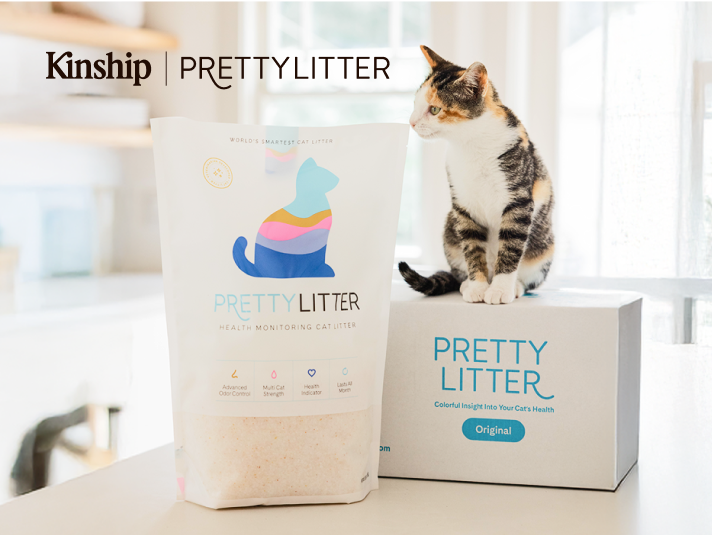How to Get Your Pernickety Cat to Try a New Food
Discover the ways to get your picky eater to expand their culinary horizons
Does your cat turn up their nose at anything but their favourite food? Have you tried to introduce a new, healthier option or a revamped recipe, only to be met with a resolute refusal?
You’re not alone. Of course, no cat parent would change their fussy feline for the world, but they don’t get their pernickety reputation for nothing. As a result, many cat parents face the challenge of introducing new food to their furry friends, and it can be a frustrating and even worrisome experience. But fear not, there are ways to get your picky eater to expand their culinary horizons without causing too much stress for either of you.
Save on the litter with color-changing tech that helps you better care for your cat.
Understanding picky eating habits in cats
Cats are creatures of habit who often find change quite stressful. This can be especially true when it comes to food.
And if you have a senior cat or your cat is generally anxious, it might be even more challenging for them to get out of their comfort zone and try something new.
Regardless of age or temperament, however, when it comes to food, it’s common for cats to develop a preference for a certain flavour, texture or smell and stick to it. If this sounds like your cat, it doesn’t mean they’re being picky just to annoy you – it’s simply normal behaviour for felines.
Reasons for changing your cat’s food
Sometimes you may need to change your cat’s food because the manufacturer stops making the old one, or they change the recipe and your cat no longer likes it.
Sometimes financial constraints can play a role in what cat food you buy, or maybe you just want to switch to a healthier, more natural or organic choice.
It’s also quite common for veterinarians to prescribe a special diet for cats with medical conditions such as allergies, diabetes or kidney disease. In those cases, it’s essential to make the transition quickly for your cat’s long-term health and well-being.
Tips for transitioning your cat to new food
Changing your cat’s diet suddenly is a sure way to cause gastrointestinal upset. That’s if they even deign to eat it in the first place.
Gradual approach
As with many things cat-related, a gradual approach is the best way to go when you are introducing a new type of food. Start by mixing small amounts of the new food with your cat’s usual food, then slowly increase the proportion over a period of 7–10 days until you’ve almost entirely replaced the old food.
This helps your cat’s palate adapt to the new flavours and textures while also giving their digestive system time to adjust.
If your cat is still resistant, go more slowly and mix in even smaller amounts of the new food each day.
Add incentives
It can also help to warm up wet food or mix it with a little bit of broth or warm water to make it more appealing and appetising for your cat. You can also try adding some of your cat’s favourite treats on top of the new food.
They may just delicately remove the treats and leave the food, but it’s worth a try.
Small portions
A cat’s stomach is about the size of a golf ball. In the wild, a domestic cat would eat about 12 small meals a day. This means that offering smaller portions more frequently throughout the day, rather than just one or two large meals, may be more appealing for some cats. This will not only help with digestion but also mimic a more natural eating pattern. An automatic timed feeder with several compartments for food can make this easier for you and your schedule.
Same ingredients
Another helpful tip is to stick to the same primary ingredients when transitioning to a new food. For example, if your cat is used to eating chicken-based food, choose a new food with chicken as the main ingredient rather than switching to a completely different protein source like fish or beef.
My cats have always preferred fishy flavours in broth or gravy, but if the consistency is like jelly or pâté, just forget it. In fact, they’d rather eat beef in sauce than salmon in jelly – cats know what they like.
Interactive food puzzles
A food puzzle toy can also be a great addition to your cat’s feeding routine. These interactive toys tap into those innate feline hunting instincts and make cats work for their food. This helps provide mental stimulation and a healthy dose of feel-good endorphins and can make mealtimes more enticing for your cat.
Can my cat adapt to their new food over time?
If your cat won’t initially eat their new food, you may find that they’ll come back later and nibble on it when they get hungry.
Having said that, no one wants to eat food that they don’t like, and cats are no exception. Unless you are lucky enough to have one of those cats that will eat anything, it’s important to find a food that your cat actually enjoys.
If they really don’t like their new food, they’re not likely to eat it any time soon no matter what incentives you offer.
Signs of food intolerance
It’s essential to monitor your cat’s reaction to any new food you introduce. If you see any signs of vomiting or diarrhoeaopens in new tab, or your cat stops eating altogether, it could be a sign that their digestive system is not tolerating the new food or simply that you are going too quickly.
If this happens, it’s best to go back a few steps in the introduction process for a few days and see if that helps.
However, if the symptoms are severe, or continue for more than one day, consult with your veterinarian as it could be a sign of an underlying health issue that needs to be addressed. It’s always better to err on the side of caution when it comes to your cat’s health.
How long before you should worry?
Cats have to consume a regular amount of protein on a daily basis to stay healthy. If a cat does not eat for some reason, they may be at risk of developing hepatic lipidosis or fatty liver disease. This is a severe liver condition that can occur in cats, particularly when they experience a sudden loss of appetite or stop eating for an extended period.
It is a serious and potentially life-threatening condition that requires veterinary attention.
So, if your cat hasn’t touched their new food after 18 hours at the absolute maximum, it’s important to take action. You can do this simply by putting down a dish of their old food. This way, they still get the required minimum of three tablespoons of food in those 24 hours. You can then start back with your new food introduction the next day. Personally, I wouldn’t even wait that long, because who wants to be hungry for 18 hours?
Keep mealtimes exciting and flexible
I mentioned earlier that cats often find change stressful, so here’s a tip for the future. Start changing up your cat’s diet by rotating the types of food you offer them on a monthly, weekly, or even daily basis. Not only does this keep mealtimes interesting, but it can also help prevent them from becoming too attached to a single brand or flavour.
This way, if one day your cat needs to be put on a special diet for health reasons, all you have to do is increase the frequency of that specific food in the rotation. It’s a win-win for everyone, and your cat will (hopefully) thank you for keeping mealtimes exciting.
Resources
Fatty Liver Disease (Hepatic Lipidosis) in Catsopens in new tab
Why Your Cat Can’t Go Without Foodopens in new tab


